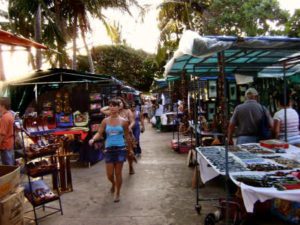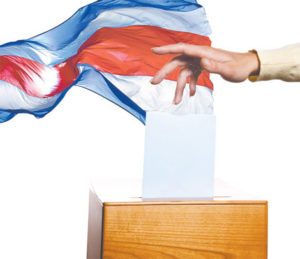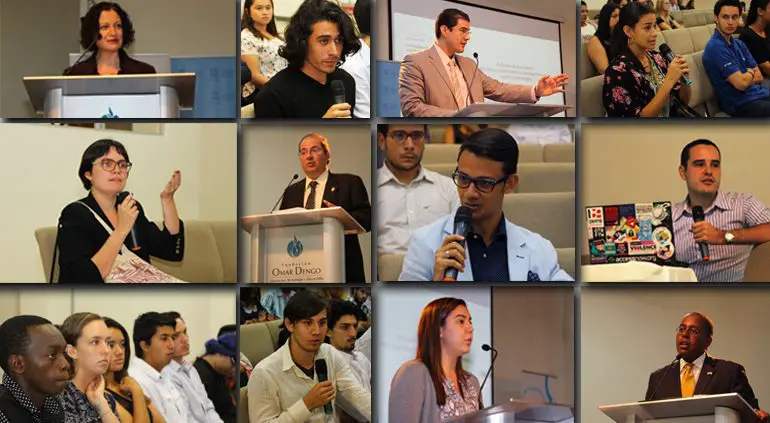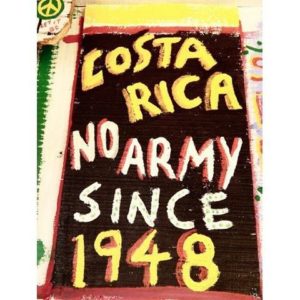Costa Rica has a stable economy and a relatively high standard of living. In fact, its economy depends mainly on tourism, which is a rapidly expanding industry, agriculture and the export of electronic components. The greatest economic resources of Costa Rica are its fertile lands and its frequent rain, its well-educated population and its strategic position in the Central American isthmus, which allows easy access to the North and South American markets and a direct access to the European and Asian continents. A quarter of Costa Rica land is dedicated to national forest reserves, often together with excellent beaches, making it a popular destination for retirees, ecotourists and everyone who likes the adventure.

Costa Rica was recognized mainly as a banana and coffee producing country. Although it is still a basically agricultural country, its manufacturing and industrial contribution to the economy has surpassed agriculture in the last 15 years. The main export products during 2004, in order of importance, were: electronic components, textiles, bananas, medical equipment, pineapple, medicines, coffee, and ready-to-serve meals. In recent years, Costa Rica has successfully attracted significant investments from companies such as Intel Corporation, which employs more than 2,000 people; Procter & Gamble, which establishes its administrative center for the Western Hemisphere; and Abbott Laboratories and Baxter Healthcare, a leader of the healthcare products industry.
The economic structure of Costa Rica is basically tourism, agriculture and the export of electronic equipment and services. The country significantly reduced poverty during 1950 and 1980 thanks to a strong impulse by the State to the production processes for the domestic market, as well as the development of a strong social investment in education, health, electricity, telecommunications, and provision of services like Water; among others.

The Costa Rica economy is the tenth largest economy in Latin America in terms of nominal gross domestic product (GDP), (after Uruguay and before Panama) and the twelfth in terms of GDP at purchasing power parity prices (PPP). ) (after Panama and before Bolivia).
The reduction of poverty stopped during the crisis of the 1980s, and stagnated at the end of the 1990s, ranging from 20 to 22% of the population. This stagnation began before liberalness policy, through which space has been opened up to private activities at the expense of many of the services previously provided by public institutions. Although the economy and wealth have grown significantly, poverty stopped decreasing because the models oriented to the creation of specialized employment exclude people without the university or technical training. The growth of the economy has passed, from 5.9% in 2005 to 8.8% in 2006 and 7.8% in 2007. Due to the economic crisis that affected the world since 2008, the economy of Costa Rica slowed its growth to 2.6 % in 2008 and decreased in 2009 with a negative of -1.1%. In 2010, growth was close to 4%, which shows a slight recovery from the economic recession; 4,5% in 2011; 4,2% in 2016. Currently, it is expected to be 4,3% at the end of 2017.

The inflation rate was around 22.5% in 1995. It fell substantially to 11.1% in 1997; 12% in 2005; 9% in 2008 and stood at 4% (2009), the lowest inflation rate in the last 38 years. The high government deficit decreased during the 1980s and 1990s, especially the amount of money destined to maintain the quality of the country’s social services. The austerity policy promulgated during the administration of Abel Pacheco de la Espriella managed to reduce the deficit and even managed to obtain a surplus in 2005, due to the low investment of the State, and meaningful improvements in fiscal matters.
Costa Rica has sought to expand its economic and commercial ties, both within and outside the region. This nation has free trade agreements with the following countries. They entered into force in (see date):
Canada – November 1st, 2002.
Chile – February 15th, 2002.
People’s Republic of China – August 1st, 2011.
Caribbean Community (CARICOM) – November 15th, 2005.
Trinidad and Tobago – November 15th, 2005
Guyana – April 30th, 2006.
Barbados – August 1st, 2006.
Belize – March 10th, 2011.
Jamaica – May 1st, 2013.
El Salvador Common Market – since 1963, re-launched on October 29th, 1993.
The United States – January 1st, 2009.
Guatemala Common Market – since 1963, re-launched on October 29th, 1993.
Honduras Common Market – since 1963, re-launched on October 29th, 1993.
Mexico – January 1st, 1995.
Nicaragua Common Market – since 1963, re-launched on October 29th, 1993.
Panama – July 31st, 1973. Renegotiated and extended on January 1st, 2009.
Perú – June 1st, 2013.
The Dominican Republic – March 7, 2002. Expanded by CAFTA on January 1st, 2009.
Singapore – May 16th, 2013.
European Union – May 16th, 2013.
It is also expected that, in the near future, the free trade agreements with EFTA and Colombia will be approved and, together with Panama, begin negotiations with South Korea.

Costa Rica lacks large indigenous populations like the rest of the countries of Central America. Thanks to the fact that the distribution of wealth is more equitable in Costa Rica, the fortunes of the Costa Rica magnates are not as great as those of their Central American colleagues.
“Wherever there is a Costa Rican, no matter where he is, he will always be free”, said Jose Maria Sanguinetti, an Uruguayan former president.
Costa Rica is a country blessed by an exuberant nature, virgin beaches, and an immense biodiversity. But what makes this country such a special place where you will always want to come back, is its people’s way of life.

“Ticos” (as Costa Ricans use to call themselves) are open, diverse, free, global, courteous, calm, humble, hospitable, hard-working, and highly educated. In a broad sense, Costa Rica is proud of its culture and the extraordinary natural wealth. Additionally, its inhabitants are persistent in their religious convictions and very family-oriented.
The ancestry of the Ticos is predominantly Spanish. For its fortune, Costa Rica was the most abandoned of the Central American colonies due to the absence of mineral wealth (gold and silver), and an abundant indigenous population. Therefore, the settlers who came to Costa Rica were not looking for minerals or the exploitation of indigenous labor, but a beautiful and quiet place to settle with their families. They gave rise to one of the largest middle classes in America. in other words, they were farm families with humble and peaceful attitudes.

Indeed, Costa Rica is the result of a peaceful nation with a long democratic tradition. It is a quiet country that has always avoided conflicts involving military actions. On the contrary, it resolves its conflicts through negotiations. Instead, its efforts have focused on developing social equality. It is considered a progressing country that has more teachers than police officers; more biological reserves than cities; and a great dedication to social programs.
With the establishment of free education as a constitutional right in 1869, the abolition of the death penalty in 1882, and the dissolution of the national army in 1948, it is clear that social development and order are key to Costa Rican development.
Nowadays, as societies become more global, the young generations of Costa Ricans are exposed daily to new ideas, cultures, and technologies. In many ways, they are forging a new and more dynamic national identity.
